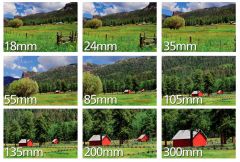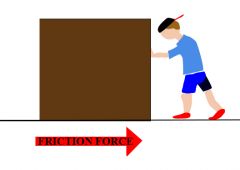![]()
![]()
![]()
Use LEFT and RIGHT arrow keys to navigate between flashcards;
Use UP and DOWN arrow keys to flip the card;
H to show hint;
A reads text to speech;
20 Cards in this Set
- Front
- Back
|
1.- Focused and Diffuse modes of thinking |
Focused mode is a mode in which we concentrate on a specific content, like when we are trying to solve a particular problem. Diffuse mode, is the "big picture" mode, which enables us to see multiple alternatives and be more creative. |
|

Did you Know? The "Big Picture" |
Diffuse and focused modes have a beautiful similarity with photography. Focal length is a property of camera lenses that determines both the angle of vision and the magnification of the objects in the scene. In small focal lengths, no particular object is of interest, the importance lies in the overall landscape. On the other hand, big focal lengths provide narrow vision, but amazing detail in a single or small group of elements. |
|
|
2.- Working memory and Long term memory |
Working memory is like a blackboard whit 4 item slots, where we put the concepts that are being handled in the moment. Long term memory is like a warehouse, where we store concepts, memories or chunks. This stored content can be accessed later. |
|

Did you know? Memory and Computers. |
Computers, like humans, use two types of memory. RAM memory is, like working memory, lets us to load/read quickly content in the computer, but it is lost if the computer is turned off. On the other hand, Hard Drives can store data to be used anytime, like long term memory. Ever lost a document in word by turning off the PC? your progress was stored in the RAM!, next time hit the SAVE button, and store it for the long run!. |
|
|
3.- The Pomodoro Technique |
Consisting on 25 minutes of intense focus, followed by brief breaks, (5 minutes), the Pomodoro technique is a useful way to tackle procrastination and keep the flow of work, avoiding mental tiredness. |
|

Did you know? work and breaks. |
Have yo ever done physical training? it is easy to notice that doing an exercise during a prolonged time makes us tired. For a training to be effective we need pauses between sets, just like in pomodoro!. Pauses enable us to do various exercises, letting our muscles to recover and performing on each set at our best. Do not skip your Pomodoro breaks, they are crucial! |
|
|
4.- Procrastination |
When we have to do a task, sometimes unpleasant feelings come to our minds, deviating our attention from the task, and moving us to do other activities that gives us temporary pleasure. This process is called, procrastination. |
|

Did you know? Starting is the hard part. |
Try to move a heavy object by pushing it. You will quickly notice that is harder to start moving the object, than to actually keep moving it. The reason?: friction force is bigger when an object is at rest. Remember what was discussed on class: often when we want to start working, we begin with unpleasant feelings, (static friction), but once we start working we get in the flow. Overcome the static friction! |
|
|
5.-Illusions of Competence. |
Whenever you had a feeling that you knew the main concepts of facts of the material, but when performing you could not recall them, you were under the illusions of competence. Some techniques can be misleading, giving us a feeling of security about our knowledge, when what they really do is telling us where we can find a concept, rather than what the concept means. |
|

Did you know? Google and Illusions. |
A recent study by Dr Betsy Sparrow [1] has proved that having information at one click distance on the internet, has diminished our ability to recall facts or ideas. Google acts in a similar way as underlining. It gives a sensation that we have mastered what was searched ("underlined"), but what we really now, is where on the internet ("text paragraph") we can find any particular idea. Beware of this illusion of competence!!!.
|
|
|
6.- Rewards and habits. |
Ever wondered why it is advisable to get a reward after you studied? Whenever we experience something rewarding dopamine is released in our brains. It act as an enhancer for habits, since the action that triggered the reward persists in our brain, "pushing us" to repeat it. Eventually, you will feel very keen to do those study sessions! |
|

Did you know? Dogs and habits. |
Have you followed a dog training program? Among various stimulus, it is advised that we give food, or a special toy to our dogs after they have performed something we are trying to teach them. Dogs also have a reward system in their brains, so they want to repeat the experience that led them to this reward. Repeat this over time, and voilá your dog can now sit, salute or even jump!!. |
|
|
7.- Beliefs and Habits. |
The most important part for developing a new habit, is the belief that motivates it. We can eventually change our routine reaction to a cue, and even reward this change; but to endure the test of time, something else is needed: the conviction that the new habit can be reached, and that when we do, our life will be enhanced. |
|

Did you know? Ali and beliefs. |
Many great sports-mans had to endure hard training to be at the top of their sport. But why did they do it?, you guessed right: they believed they could excel.
"It's the repetition of affirmations that leads to belief. And once that belief becomes a deep conviction, things begin to happen." |
|
|
8.- Sleeping and learning. |
Sleeping is a key activity in our learning. While we sleep we review the hardest parts of the concepts that we studied, we give time to our brain to organize concepts and store them in the long term memory and we clean our brains from metabolic waste. |
|

Did you know? Become smarter and healthier. |
Sleeping is not only beneficial for our learning, but for overall functions of our body. Quality sleep promotes fat loss, it enables the growth hormone to repair our damaged cells and balances the water in our body. A good night's sleep, can prevent you from aging faster, and give you a fresh look in the mornings. |
|
|
9.- Recalling and learning. |
Recalling is an technique that consists in trying to remember as many concepts from the material as we can, after we have read it. It is an extremely effective technique , and greatly enhances the possibility to store the recalled concepts in our long term memory. |
|

Did you know? Handy tools |
In the 1950s, Walter Pauk created an ingenious method for organizing notes, oriented to college students called the Cornell Notes. It consists on dividing the notepaper in different zones: The main zone being for notes, a left side zone for questions about the notes, and the inferior part for a summary of the lecture. The method benefits synthesizing, applying, self-testing and recalling the material, the last, by the use of the side questions. |
|
|
10.- Metaphor, story, and visualization in learning. |
In order to improve our chances that the material will be remembered, it is advisable to make it memorable. Metaphors appeal to something we already know, stories have a particular flow and put concepts in a big scheme, and since our visual sense is directly connected to the right hemisphere, it is a great idea to use some funny and appealing images while you learn. |
|

Did you know? Now you do! |
Amongst the Did you know section, we have found some metaphors, (Static Friction), some stories, (Ali), and in every one of them, a memorable image. I did this so the concepts stick to you more than just a definition but as an experience. I also tried to include some knowledge from other areas, so you might feel appealed to broaden your interests. Thank you for taking the time to read this cards, and congratulations as well. |

